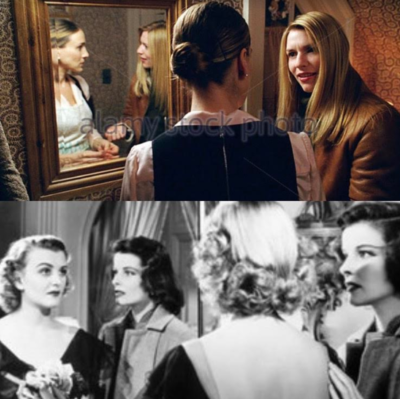Ah, is there any more complex relationship than the one shared between sisters? Likely not. For, in contrast to the brother-brother or brother-sister permutation, there can be no greater source of deep-seated competition rooted in jealousy than the rapport that exists among deux soeurs–especially ones close enough in age to elicit semi-equal amounts of attention in the looks department from a bloke. Even a bloke that’s spoken for by one of the sisters in question.
Never has there been any better example of this than in George Cukor’s 1938 film, Holiday, an eventual precursor to another holiday-themed movie with a similar sororal dilemma, 2005’s The Family Stone. In Holiday, the obvious choice in terms of which sister is best suited to being “wife material” is Julia Seton (Doris Nolan), a chipper but manipulative blonde who encounters her beau, Johnny Case (Cary Grant), while skiing in Lake Placid. Much the way Meredith Morton (Sarah Jessica Parker) makes the most of her encounter with Everett Stone (Dermot Mulroney) while they’re both on a business trip in Asia, so, too, does Julia seize on her moment to make enough of an impression to finagle an engagement. The only catch is that her family is a bit, well, particular. This the Setons and the Stones definitely have in common. Where the Setons find their fastidiousness stems from being wealthy–and old money at that. For the Stones, displaying a lack of warmth toward outsiders can be summed up in the exchange between Meredith and matriarch of the family Sybil Stone (Diane Keaton) as the latter has reached the end of her rope: “What’s so great about you guys?!” Meredith demands. Sybil responds apologetically, “Nothing. It’s just we’re all we’ve got.”
Certain members of the Seton family don’t quite feel the same sense of solidarity. Ned Seton (Lew Ayres), the only male heir, is especially loathing of what it means to be a Seton, burying his face in a glass or bottle most of the time to ignore the soul-crushing responsibility of not being permitted to disappoint the family name and with it, his father, Edward (Henry Kolker). In this regard, he’s most akin to Ben Stone (Luke Wilson), the deadbeat stoner of the family. Like Ned, Julia is also well-aware of the implications of this responsibility to their name, which is precisely why she chooses to inform her father of her intent to marry Johnny while he’s in church, and therefore can’t react.
Before Johnny is introduced to Edward, he is given the chance to tango, so to speak, with the self-declared “black sheep” of the family, Linda (Katharine Hepburn). Warm, approachable and fun-loving in a way that Julia never can be, this is also exactly what makes Meredith’s sister, Julie (Claire Danes), so much more instantaneously appealing to Everett when he picks her up from the bus station after Meredith summons her for moral support to deal with the pounced upon feeling she gets from the Stones. That same burst of electricity exists between Johnny and Linda, though, of course, in both instances, the sister is more adamant about suppressing such overt sentiments. Mainly because men are naturally more caddish. And when it comes to the underlying fetish of boning both sisters in the family, well, that’s a tale as old as, among others, Pride and Prejudice (except the part where no one fucks in Jane Austen novels).
At least with Holiday, however, screenwriters Donald Ogden Stewart and Sidney Buchman gradually and organically unravel the romantic tensions building between Johnny and Linda. With Everett and Julie, there’s an instant sense of writer-director Thomas Bezucha simply wanting to hit all the points as quickly as possible so as to neatly tie in a bow how the relationship deviations and transformations are going to be gift-wrapped in act three.
While Julie is caught up in Everett’s ultimately fake plans to marry Meredith by trying on his mother’s ring and getting it caught on her finger, Linda feigns as best as she can wanting to assist Johnny in any way she is able to by “greasing the wheels” for him to get acquainted with and welcomed by the family. Oh these charades that the sisters put up as a means of coming across as the dutiful sibling they most definitely aren’t. Because when passions–or worse, passions believed to be love–are at play, all sense of familial obligation goes out the window. Just ask the Montagues and the Capulets. Even shut-in Emily Dickinson knew, “The heart wants what it wants–or else it does not care.” Which is why you can’t blame both Linda and Julie for abandoning all sense of logic and reason in risking irreparable emotional damage caused to their respective sisters in just going for it with her boyfriend. You can, however, blame Johnny and Everett for encouraging and baiting such behavior. Honestly, if there was a sequel to either of these you know they’d both be trying to get a threesome going. But as the ultimate beacon of sister rivalry–What Ever Happened to Baby Jane?–taught us, there can only be one star of the show. And it’s always going to be the less frigid one. The girl he chose to leave anyway.
In any event, if your sister brings a fiancé home next holiday season, learn your lessons from Linda and Julie by feeling totally comfortable in stealing him away. He was already disinterested in your boring ass sorella anyway.






















